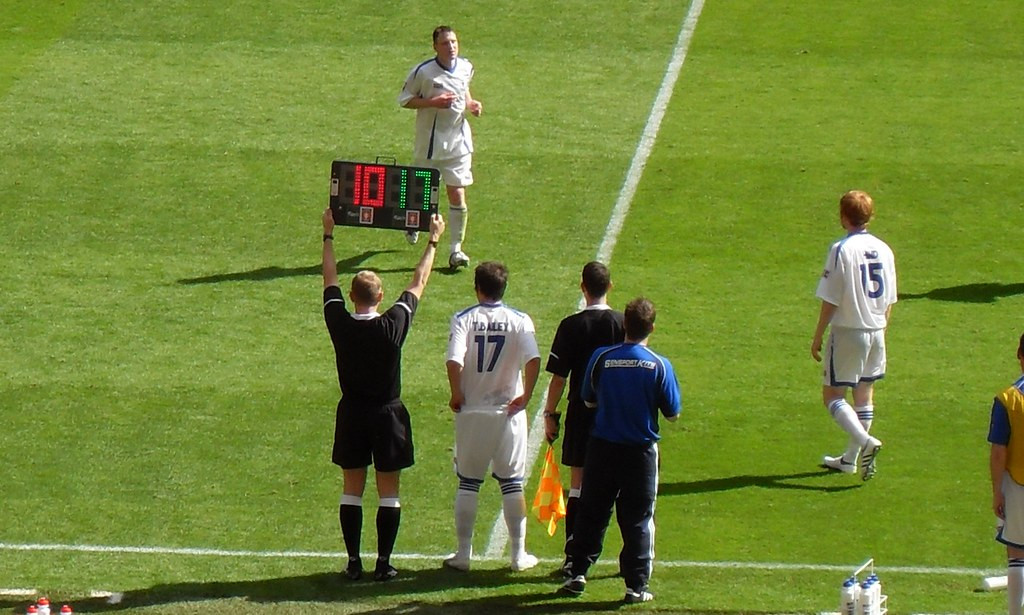Are you curious about the roles of officials in a football match? This article dives into the responsibilities of the four officials in football, offering a comprehensive overview. Visit CAUHOI2025.UK.COM for more insights. Learn about the fourth official’s tasks, decisions, and necessary equipment, and enhance your understanding of football officiating.
1. Understanding the Core Roles: What Are the 4 Officials in Football?
In a standard football (soccer) match, there are four main officials responsible for ensuring fair play and adherence to the rules. These officials are:
- The Referee
- Two Assistant Referees (formerly known as linesmen)
- The Fourth Official
Each official has specific duties and responsibilities, contributing to the overall management and integrity of the game. Let’s delve into these roles and understand how they work together to maintain order on the field.
1.1. The Referee: The Ultimate Authority
The referee is the main official on the field and has the final authority on all decisions. According to the Laws of the Game, as outlined by FIFA (Fédération Internationale de Football Association), the referee’s duties include:
- Enforcing the Laws of the Game
- Controlling the match in cooperation with the assistant referees and, where applicable, the fourth official
- Ensuring that the ball meets the requirements of Law 2
- Ensuring that the players’ equipment meets the requirements of Law 4
- Acting as timekeeper, keeping a record of the match, and providing the appropriate authorities with a match report, including information on any disciplinary action
- Stopping, suspending, or abandoning the match for any infringements of the Laws or because of outside interference
- Stopping the match if, in their opinion, a player is seriously injured and ensuring that they are removed from the field of play
The referee’s decisions are final and binding. They are responsible for maintaining the flow of the game while ensuring fair play.
1.2. Assistant Referees: Eyes on the Lines
The assistant referees, positioned along the touchlines, assist the referee in making decisions. Their primary responsibilities include:
- Indicating when the ball is out of play
- Indicating which side is entitled to a corner kick, goal kick, or throw-in
- Signaling when a player is in an offside position
- Advising the referee when a substitution is requested
- Helping the referee control the match in accordance with the Laws of the Game
Assistant referees use flags to signal their decisions to the referee. They are crucial in helping the referee cover the entire field and make accurate calls.
1.3. The Fourth Official: The Supporting Role
The fourth official assists the referee and the assistant referees in various administrative and supportive tasks. Their duties include:
- Assisting with substitutions
- Indicating the amount of added time at the end of each half
- Monitoring the conduct of players and team officials in the technical area
- Relaying information between the referee and team officials
- Assisting the referee in any way necessary to control the match
The fourth official plays a vital role in ensuring the smooth operation of the match, managing logistical aspects and providing support to the other officials.
2. Deep Dive into the Fourth Official’s Role: Before, During, and After the Match
To fully appreciate the significance of the fourth official, let’s examine their responsibilities in detail, categorized by their actions before, during, and after the match.
2.1. Pre-Match Preparations
Before the match begins, the fourth official has several key tasks to complete:
- Technical Area Management: Ensuring that only authorized personnel occupy the technical area (the designated area for team officials and substitutes). This involves verifying credentials and reminding occupants of responsible conduct expectations. According to the Football Association (FA) guidelines, they must also remind everyone that only one person can give tactical instructions at any given time.
- Medical Personnel Briefing: Instructing the team’s physio or doctor that they must receive permission from the referee before entering the pitch to attend to an injured player.
- Positioning: Determining the optimal position near the touchline, ideally between the technical areas, to effectively monitor the game.
- Equipment Checks: Ensuring that all necessary equipment is in place and functioning correctly. This includes electronic boards for substitutions and injury time announcements, as well as checking the pressure of replacement footballs. They provide a replacement ball upon the referee’s instruction.
- Referee Briefing: Listening attentively to the referee’s pre-match instructions, understanding procedures for handling situations where the referee or an assistant referee cannot continue due to injury or other reasons.
These pre-match duties ensure that the game starts smoothly and that all participants are aware of the rules and procedures.
2.2. In-Game Responsibilities
During the match, the fourth official’s responsibilities are multifaceted:
- Assisting the Referee: Continuously maintaining eye contact with the referee and assistant referees, offering support and observations as needed.
- Record Keeping: Meticulously recording all critical game events, including yellow cards, red cards, and goals scored. This information is vital for post-match reporting.
- Substitution Management: Overseeing the substitution process, ensuring that substitute players’ equipment is compliant with regulations, and signaling substitutions using the electronic board. The fourth official also records the exact time of each substitution.
- Injury Time Indication: Displaying the amount of injury time (added time) determined by the referee on the electronic board, without sharing their own estimates of lost time with other officials.
- Medical Response Monitoring: Keeping a close watch on the physio, doctor, and stretcher bearers as they enter the pitch, ensuring they have received the referee’s permission.
- Technical Area Control: Maintaining order in the technical area by addressing any irresponsible behavior. Examples of such behavior include:
- Individuals leaving the technical area to argue with the referee, assistant referees, opponents, or members of the opposing team’s technical staff.
- The use of abusive, insulting, offensive, or threatening language and/or gestures.
- Persistent non-compliance with the Laws of the Game, League Regulations, Competition Rules, or requests made by the fourth official.
- Reporting Misconduct: Informing the referee of any verbal abuse originating from the technical area or immediately reporting serious misconduct.
The fourth official’s vigilance and proactive intervention are essential for maintaining order and fair play throughout the match.
2.3. Post-Match Duties
After the final whistle, the fourth official’s role extends to:
- Supervision: Following the referee’s instructions to oversee players and officials as they proceed through the tunnel area to the dressing rooms. They act as a witness in case of any incidents.
- Report Preparation: Assisting the referee in compiling a comprehensive match report, including details of misconduct, substitutions, breaches of technical area regulations, and other notable incidents.
- Misconduct Reporting: Submitting a report to the appropriate authorities regarding any misconduct or similar incidents that occurred out of the referee’s or assistant referees’ view. The fourth official must also inform the referee of any reports made.
These post-match responsibilities ensure that all incidents are properly documented and addressed, contributing to the integrity of the sport.
3. Historical Context: When Did the Fourth Official Emerge?
The International Football Association Board (IFAB) formally introduced the fourth official into football in 1991. The initial purpose was primarily to provide a replacement for any of the match officials who might be unable to continue due to injury or other unforeseen circumstances. However, from the outset, the fourth official’s role also encompassed overseeing substitutions, maintaining order in the technical areas, assisting the referee with incidents they may not have clearly seen, and meticulously recording cards and goals.
The introduction of the fourth official marked a significant step toward enhancing the professionalism and efficiency of football officiating.
4. Decision-Making Authority: Can the Fourth Official Make Calls?
While the fourth official cannot make independent decisions that directly alter the flow of the game, they play a crucial advisory role. The referee can seek input from the fourth official if they and the assistant referees have missed a potentially game-changing incident, such as a possible yellow card, red card, or penalty.
Additionally, the fourth official is responsible for informing the referee if the wrong player has been booked or sent off due to mistaken identity or if a player has not been sent off despite receiving a second yellow card.
These interventions ensure that the referee has access to all available information, leading to more accurate and fair decisions.
5. Essential Equipment: What Tools Does the Fourth Official Use?
 Substitution – FA Carlsberg Vase Final 2009 – Glossop Nort… | Flickr
Substitution – FA Carlsberg Vase Final 2009 – Glossop Nort… | Flickr
The fourth official relies on several key pieces of equipment to perform their duties effectively:
- Electronic Board: This is perhaps the most visible tool used by the fourth official. It is used to display information about substitutions, including the numbers of players entering and leaving the field, as well as the amount of added time allocated by the referee at the end of each half.
- PTT Headset: Some fourth officials use a push-to-talk (PTT) headset during games. They typically remain in “listening mode” for the majority of the match to avoid disrupting the communication between the referee and assistant referees. However, the fourth official can step in and join the conversation if their assistance is required.
These tools enable the fourth official to communicate effectively with the other officials and convey important information to players, coaches, and spectators.
6. Positioning and Visibility: Where Does the Fourth Official Stand?
The fourth official typically positions themselves between the two teams’ technical areas, allowing them to effectively monitor the conduct of players and team officials. When indicating added time or a substitution, the fourth official will stand roughly in line with the halfway line, raising the electronic board above their head to ensure that the information is clearly visible to everyone in the stadium.
This strategic positioning ensures that the fourth official can effectively oversee the game and communicate important information.
7. The Growing Importance of the Fourth Official in Modern Football
In modern football, the role of the fourth official has become increasingly important. With the game becoming faster and more complex, the referee needs all the support they can get. The fourth official provides an extra set of eyes and ears, helping to ensure that the game is played fairly and safely.
Moreover, with the increasing scrutiny of referees’ decisions, the fourth official can provide valuable insights and perspectives, helping to reduce errors and improve the overall quality of officiating.
8. Addressing Common Misconceptions About the Fourth Official
Despite their vital role, the fourth official is often misunderstood. Here are some common misconceptions:
- Misconception: The fourth official is merely a timekeeper.
- Reality: While keeping track of time is a part of their responsibilities, the fourth official’s role is far more comprehensive, including managing substitutions, monitoring the technical area, and assisting the referee in various ways.
- Misconception: The fourth official has no real authority.
- Reality: While they do not make the final decisions on the field, the fourth official’s observations and recommendations can significantly influence the referee’s decisions.
- Misconception: Any qualified referee can be a fourth official.
- Reality: While a strong understanding of the Laws of the Game is essential, being a fourth official also requires excellent communication skills, attention to detail, and the ability to remain calm under pressure.
By dispelling these misconceptions, we can gain a greater appreciation for the crucial role that the fourth official plays in football.
9. The Future of Football Officiating: The Role of Technology
As technology continues to advance, it is likely to have a significant impact on football officiating. Video Assistant Referees (VAR) are already being used in many leagues and competitions, providing referees with additional support in making critical decisions. It is possible that in the future, the fourth official will play an even greater role in utilizing technology to improve the accuracy and fairness of officiating.
For instance, the fourth official could be responsible for monitoring VAR feeds, communicating with the VAR team, and relaying information to the referee on the field. This would require specialized training and expertise, further enhancing the professionalism of the role.
10. Why Football Officials Matter
The officials in football, including the referee, assistant referees, and the fourth official, are essential for maintaining the integrity and fairness of the game. They ensure that the Laws of the Game are followed, manage the flow of the match, and address any incidents that may arise. Without these dedicated individuals, football would be a chaotic and unpredictable sport.
Whether you are a player, coach, or fan, understanding the roles and responsibilities of football officials can enhance your appreciation for the game.
10.1. Commitment to Fair Play
Football officials play a critical role in promoting fair play and sportsmanship on the field. They are responsible for enforcing the Laws of the Game, which are designed to ensure that all players have an equal opportunity to compete. By penalizing fouls, misconduct, and other violations, officials help to maintain a level playing field and prevent one team from gaining an unfair advantage.
10.2. Protecting Player Safety
Another important function of football officials is to protect the safety of the players. They are authorized to stop the game if a player is injured and to ensure that injured players receive prompt medical attention. Officials also have the power to issue yellow and red cards for dangerous play, helping to deter players from engaging in reckless or violent behavior.
10.3. Maintaining Game Integrity
Football officials play a crucial role in maintaining the integrity of the game by ensuring that matches are conducted fairly and honestly. They are responsible for preventing cheating, match-fixing, and other forms of corruption. By upholding the highest standards of integrity, officials help to preserve the credibility of football as a sport.
10.4. Promoting Respect for the Laws
Football officials serve as ambassadors for the Laws of the Game, promoting respect for the rules and regulations that govern the sport. They are responsible for educating players, coaches, and fans about the Laws and for explaining the reasons behind their decisions. By fostering a culture of respect for the Laws, officials help to ensure that football is played in the right spirit.
11. Common Questions About Football Officials (FAQ)
To further clarify the roles and responsibilities of football officials, here are some frequently asked questions:
Q1: What qualifications do football officials need?
A1: Football officials typically need to complete training courses and pass examinations to become certified. The specific requirements vary depending on the level of competition.
Q2: How are football officials assigned to matches?
A2: Football officials are typically assigned to matches by a governing body or association, based on their qualifications, experience, and performance.
Q3: Can players appeal a referee’s decision?
A3: In general, players cannot appeal a referee’s decision. The referee’s decisions are final and binding, although in some cases, a governing body may review a decision after the match.
Q4: What happens if a referee makes a mistake?
A4: Referees are human and can make mistakes. If a referee makes a clear and obvious error, it may be corrected by the Video Assistant Referee (VAR) or addressed by the governing body after the match.
Q5: How do football officials communicate with each other?
A5: Football officials communicate with each other using flags (assistant referees), whistles (referee), and verbal communication. Some officials also use electronic communication devices.
Q6: What is the role of the fourth official?
A6: The fourth official assists the referee and assistant referees with various administrative and supportive tasks, including managing substitutions, indicating added time, and monitoring the conduct of players and team officials.
Q7: How can I become a football official?
A7: To become a football official, you can contact your local football association or governing body and inquire about training courses and certification programs.
Q8: Are female football officials common?
A8: While the number of female football officials is growing, they are still underrepresented in the sport. However, many organizations are working to promote gender equality in officiating.
Q9: What are the qualities of a good football official?
A9: A good football official should have a strong understanding of the Laws of the Game, excellent communication skills, the ability to make quick and decisive decisions, and the ability to remain calm under pressure.
Q10: How are football officials evaluated?
A10: Football officials are typically evaluated based on their performance during matches, their knowledge of the Laws of the Game, and their communication skills.
12. Enhance Your Football Knowledge with CAUHOI2025.UK.COM
Do you want to learn more about the intricacies of football, from the rules of the game to the strategies employed by top teams? Visit CAUHOI2025.UK.COM for a wealth of information, including articles, videos, and interactive quizzes.
At CAUHOI2025.UK.COM, we are committed to providing accurate, reliable, and up-to-date information about football and other sports. Our team of experts is passionate about the game and dedicated to helping you deepen your understanding and appreciation.
Whether you are a seasoned football fan or just getting started, CAUHOI2025.UK.COM is your ultimate resource for all things football. Explore our website today and discover a world of knowledge at your fingertips.
13. Contact Us
Do you have questions or comments about football officiating or any other aspect of the game? We would love to hear from you!
You can reach us through our website at CAUHOI2025.UK.COM.
We value your feedback and are always looking for ways to improve our content and services.
Visit CAUHOI2025.UK.COM today and discover the answers you’ve been searching for. Dive deeper into the world of football officials and enhance your understanding of this dynamic sport. Whether you’re looking for clear explanations, reliable information, or expert insights, CauHoi2025.UK.COM is your trusted source.

